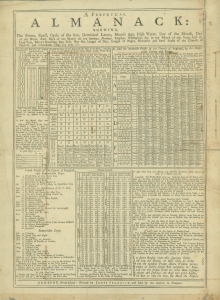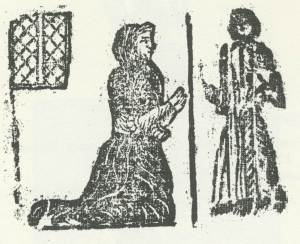Ann Smith was born in Boston, Mass. in 1696 to puritans Samuel and Anna Smith. For some context, this means she grew up during Queen Anne’s War (1702-1713) and witnessed the 1721 smallpox outbreak in Boston which killed 850 and infected approximately 6,000 in a population of just 11,000 people.
In a pivotal decision, on February 4th, 1723, she married James Franklin at the New North Church (Congregationalist), in Boston. Franklin, elder brother to Benjamin, founded the New England Courant in 1721 & the Poor Robin Almanacs. He was already a muckraker when she married him, as he had been jailed for four weeks in June 1722 for printing a report suggesting the Mass. Legislature was colluding with Newport pirates. His publications were notable for their use of proverbs, poetry, controversy and satire. He vocally opposed smallpox inoculation methods thereby crossing the powerful Cotton & Increase Mather. Younger brother Benjamin was indentured to him to learn the printing trade until he ran away to Philadelphia in September of 1723.
When the New England Courant was suppressed in Boston in 1727, James and Ann moved the press and the family to Newport, R.I. (pop. 4500) under the encouragement of his brother John, who was an establish chandler in the town. Thus the couple established the first printing press in the Colony of Rhode Island.
They used an English Ramage press that James brought from London to Boston, with type, in 1717. The original wooden press can still be viewed today at the Newport Historical Society Museum on loan from the Massachusetts Charitable Mechanic Association. It was on loan to the R.I.H.S. in 1959 when it graced the cover of Rhode Island History:

Women and children often worked in typesetting because of the intricacy of the hand work. Howard M. Chapin attributes the typesetting of A Perpetual Almanac to Ann’s “nimble hands” although the imprint carries her husband’s name. The R.I.H.S holds the only known copy of this broadside.


From 1735 to 1748 she ran the press with the assistance of two of her three daughters, less her son James Jr. who was apprenticed to Uncle Benjamin in Philadelphia. During this time Ann produced approximately 50 imprints including the Acts of the General Assembly for which she submitted individual bills to the State.


Son James Jr. returned to Newport in 1748 at age 17 to “take over” the family business. They worked together until his death at age 30 in 1762, shortly after he began the Newport Mercury newspaper. She then partnered with printer Samuel Hall until her death in 1763.
The family had joined Ezra Stiles’ congregation in Newport and it is remarkable that in his records he notes her occupation as “printer”.


~Phoebe Bean, Librarian
